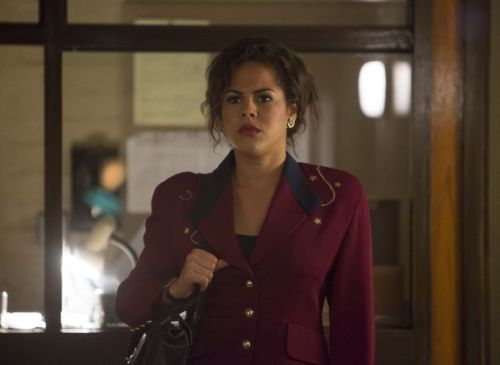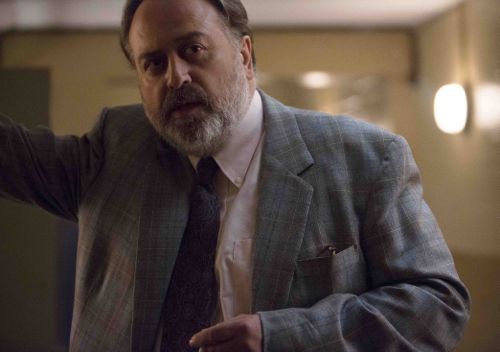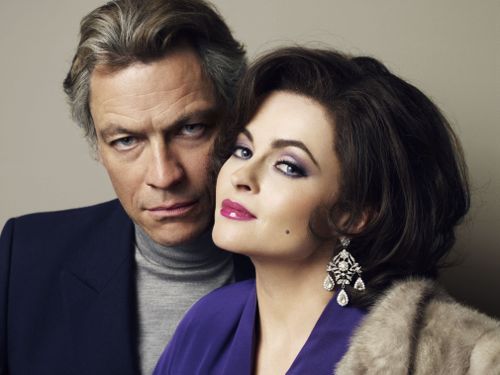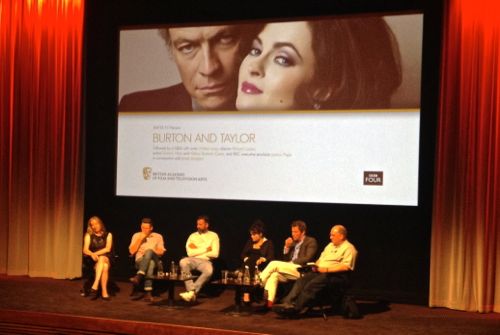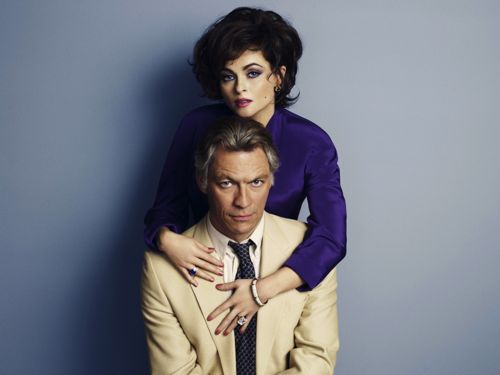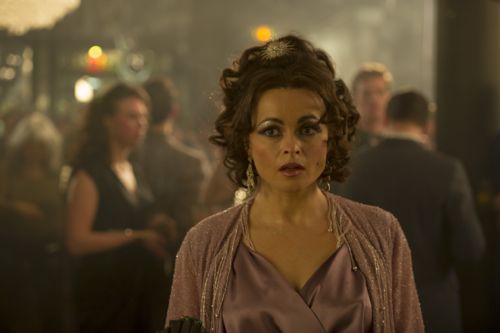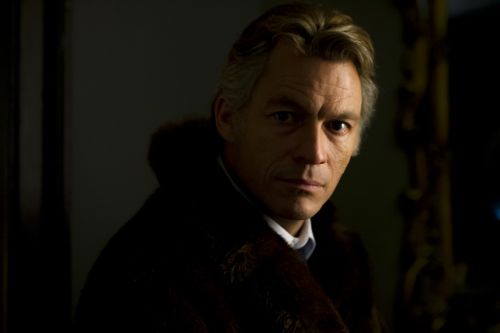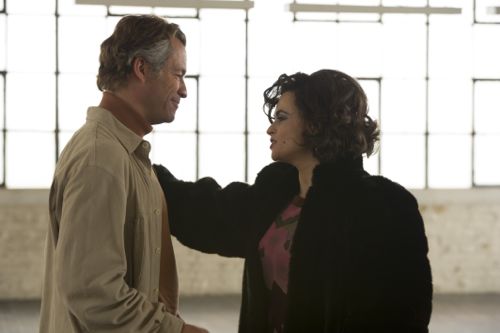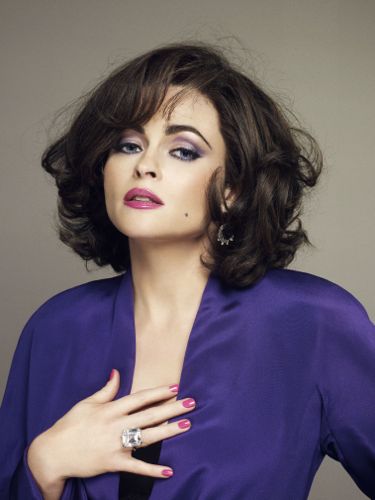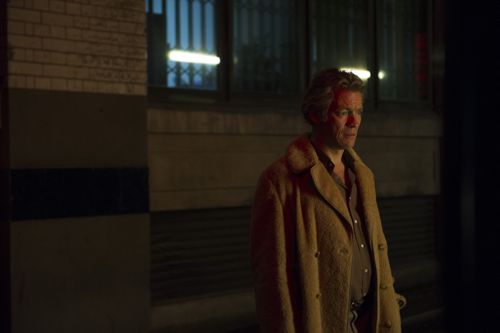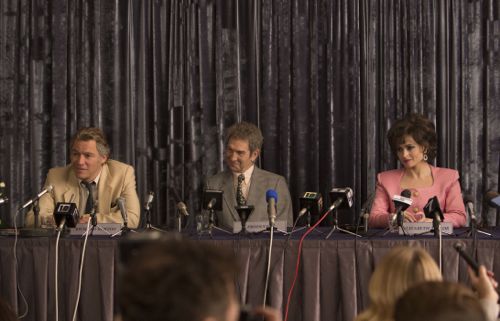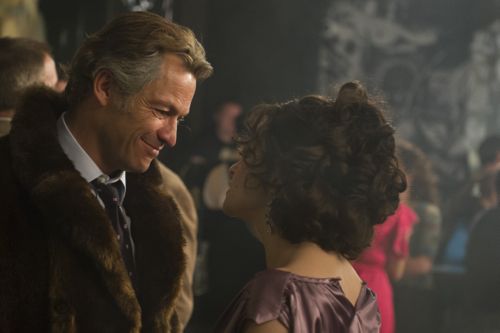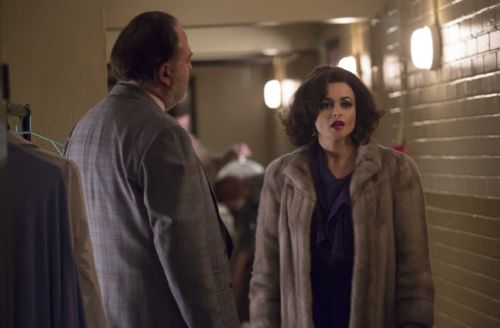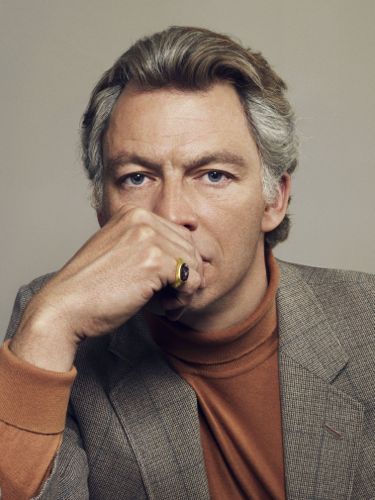“WE’RE addicts Elizabeth, you and I.”
It begins in the New York of early 1983.
And then flashes back to London seven months before.
Richard Burton walks into Elizabeth Taylor’s 50th birthday party wearing a mink coat…
The next year they are rehearsing together for her American stage production of Noel Coward’s Private Lives.
The world’s most famous couple – married to each other twice and divorced twice – yet again at the centre of a media circus.
Burton and Taylor is a film worthy of both screen legends, generally agreed to be two of the finest actors ever.
With Taylor regarded as the world’s most beautiful woman and Burton the gloriously-voiced hellraiser every female wanted to tame.
This diamond of a 90-minute drama is broadcast on BBC4 at 9pm next Monday (July 22).
Dominic West and Helena Bonham Carter sparkle as Burton and Taylor.
Not least due to one of William Ivory’s best ever scripts and the direction of Richard Laxton.
I was lucky enough to see a preview screening at BAFTA in London last night (Monday) followed by a Q&A – my full transcript is below.
It was all but standing room only for this very special film, the last in a series of often acclaimed BBC4 acclaimed “biopics”.
Like most of those previous dramas, it focuses on one significant period in the lives of its subjects.
Co-produced with BBC America, Burton and Taylor captures the essence of their magnetic mutual attraction and addiction.
While leaving you with, perhaps, a smile on your face and tear in the eye.
If you’re too young to remember much about Burton and Taylor, check out the links at the bottom of this blog and take a look at them in their golden days.
My Q&A transcript will also, hopefully, give you a better idea of why you should not miss this drama.
A few tasters:
Dominic West: “I just thought it was a beautiful story and all the more poignant. It seemed to me so much about passing of time and of youth and of beauty and fame and therefore all the more poignant that it was these two huge figures that it was about.”
Helena Bonham Carter: “We were definitely trepidatious and anxious. We were terrified. But you know it’s funny because I just said that I didn’t want to get distracted. I often felt that they were upstaged by their own fame. And I don’t want this to be upstaged by their fame either. I think it’s a beautiful script and I did it because of the script. And it was incidental that it’s called Burton and Taylor.”
Director Richard Laxton: “This is just a story about the calamity of being a human being.”
Executive producer Jessica Pope: “You can’t be as beautiful as Liz, you can’t be as extraordinary an actor as Burton. But you can go through a relationship that causes you great pain and you don’t quite understand why and you still keep going back…so that’s universal. That’s something everybody can experience.”
********************************************************
Q&A with writer William (Billy) Ivory / Director Richard Laxton / Dominic West / Helena Bonham Carter / Executive Producer Jessica Pope and chaired by James Rampton.
In typical Elizabeth Taylor style, Helena was fashionably late joining the panel on stage. In her absence, an audience member asked about typecasting.
Dominic West: (Smiling) “Because I didn’t know Helena before, I’m never quite sure how much was Elizabeth and how much was Helena.” (laughter)
Q: The genesis of the project?
Jessica Pope: “We were aware that the last BBC4 film was due and we wanted to make a splash with it. I think the original idea for doing a piece about Burton and Taylor came from Catherine Moulton, our script editor, who had read about the Private Lives run. We talked about it and came up with the idea of bringing it to Billy. There was no better person in my mind to write it, to examine this extraordinary relationship and bring some real universality and humanity to it. So I spoke to Billy about a year and a half ago, and you (Billy) actually grabbed it, didn’t you? Strangely enough it was something that Billy had already been thinking about because he was a huge fan of Richard Burton. Which I didn’t know when we first spoke. So, luckily you were free at the time…”
Helena then arrived on stage to applause.
Helena Bonham Carter (in character as Elizabeth): “I’m so sorry…” And as Helena: “I can be late now. A license to be late for the rest of my life.”
Q: So Billy, it was something that was in your mind already, a story about Richard Burton and Elizabeth Taylor?
William Ivory: “Yeah. Probably more, if I’m honest, about Richard Burton. Not only because my father was from south Wales, from very close to where Burton was born and was also of that generation. My mum used to talk about hell raisers, that group of men who used to live and play hard, which was very true of my dad. But really what brought me to it, I’ve not had a drink now for about 11 years but I’ve liked a drink myself in the past, as my dad did. And so I was just interested in that world of Welsh men, to be quite honest. Then when it opened it up, to find out more about Elizabeth and that particular period of that run, it was just such an extraordinary time. And I thought the chance to examine their relationship and the nature of addiction as well.”
Q: Helena – when you were offered it, what appealed about this role?
Helena Bonham Carter: “Well, I loved the script. At first it was like, ‘Elizabeth Taylor! Run a mile.’ My mum’s here. She won’t appreciate this but she just said, ‘Don’t touch it with a barge pole. It’s a movie icon. Are you stupid or what?’ And I met Richard (Laxton). But I loved the script. The script was great and it was very moving and touching and it was a love story. And it was almost to me incidental that it was about these two most famous people and most famous lovers. But I met Richard and he seemed very nice and very clever, the script was wonderful. And then I tussled with myself. ‘I’m so never going to look like her. She was inimitable. So this is just a misconceived idea.’ And then I suddenly thought, ‘Well actually, let’s just forget about what she looked like, let’s look at the woman.’ And then through various different areas I has, strangely, some mutual friends and reading biographies. I kind of researched it before I said yes. And then I thought, ‘I’ve got to do this.’ Because she was such a phenomenal woman. Her inside bits were…I mean, not the bits but just her character was as extraordinary as her exterior. Which is saying something because she was so beautiful. So as a character there was such an inspiration. And sometimes you feel like…you don’t know why, you just have to do something. It’s a compulsion. So there you go. And I just wanted to work with him (Dominic). (Laughter)
Q: Dominic – what drew you to Richard Burton?
Dominic West: “Well I’d always loved him, so I was obviously straight away interested and obviously the danger was he was such an amazing, sexy, charismatic man with the best voice of all time. So it was only after reading the script that I realised it was do-able in the part of his career that it was focusing on and in the part of their love that it was focusing on. Although he’s a lot older than me, Richard Laxton told me that wasn’t going to be a problem. (laughter) So I just thought it was a beautiful story and all the more poignant. It seemed to me so much about passing of time and of youth and of beauty and fame and therefore all the more poignant that it was these two huge figures that it was about. And Richard came and saw me in two plays that I was doing, so I was incredibly chuffed by that. And he was lovely. So I wanted it. And also I wanted to work with Helena.” (laughter)
Q: Richard – what made you think that these two actors would be so right for these roles?
Richard Laxton: “Well, it goes back a stage, really. When I read the script…my glorious agent sent it to me and I thought, ‘I don’t want to make a film about Richard Burton and Elizabeth Taylor. It’s impossible.’ Then I read his script and went. ‘This is just a story about the calamity of being a human being.’ And so I was interested in a spirit of them. You take a piece like this and you get to the core of what it’s about. And you need an incredibly charismatic, intelligent and mischievous woman. She wasn’t available. (laughter) And then you need an extraordinary powerful male figure. And he wasn’t available. (laughter)”
Helena Bonham Carter: “Well, I wasn’t the first choice. Was I bitter…” (laughter)
Richard Laxton: “These things have a habit of working out so beautifully though. Anyway, so it was the essence. And seeing Dominic on stage and having seen his work and obviously knowing Helena, I just thought…I prayed at how they would actually get on and there would be a kind of chemistry…which I think, from where I sat by a monitor, I thought they managed to….”
Helena Bonham Carter: “…pretend.”
Richard Laxton: “…master.”
Q: Because they had terrific fun together, didn’t they, as much as everything else?
Richard Laxton: “Well the thing is, when you fall in love with someone you do have fun and it’s the bits that aren’t fun that everyone focuses on. But the essence of their spirit was that they got each other, more than anybody that each other had really met probably. And therefore you have to show that. Someone asked me earlier, ‘Is it a tragedy?’ And I said, ‘No, it’s a celebration of individuality and an essence of two people.’ It might not fundamentally work at this point in their lives but it had worked brilliantly. And that’s what you have to capture and try and get up there.”
Q: Dominic – didn’t you read a story in a 1971 issue of Vogue which captured their sense of fun?
Dominic West: “The fun they had? It was that scene at the end where they’re doing the keep fit while drinking Jack Daniels and smoking. On set there was a 1971 Vogue, by chance, just set dressing. And I was reading it and there was an article by Richard Burton – it was called One Day In My Life. It was Liz in Puerto Vallarta where they lived in Mexico and the circus had come to town. They went to the circus and the ringmaster spotted Liz Taylor and called her out and attached her to this big board and spun her round and started throwing knives at her. And Burton went crazy. He was trying to stop them. And she said, ‘Oh Richard leave him. You’re making him nervous.’ (laughter) She was such a star. She did it with such panache.”
Helena Bonham Carter: “I was ballsy. I mean, she was ballsy.”
Dominic West: “And then they tried to get Burton to do it and he said, ‘No ******* way.’ And then the article ended with them both getting back home and getting into bed and Liz turning out the light and going, ‘Well, another interesting day.’ It does strike you that they had an amazing time together. They had a great, great time. There’s a scene in Who’s Afraid Of Virginia Woolf?, I hadn’t spotted before, and they just go off on one, with him doing this sort of thing of, ‘Oh shucks, I’m so shy.’ And offering her flowers. And they had this incredible double act and they’re just brilliant together as actors as well. And you just realise that’s what was so magnetic about them. Anyway. They got on well.”
Q: And she had a great sense of humour as well, didn’t she?
Helena Bonham Carter: “I hear she was really, really funny. Very, very funny. And very, very witty and very, very clever and very wise. She was extraordinary. An amazing strength of character. She wasn’t a victim. To sustain that amount of fame and that beauty from such a young age. Like her peers…why am I still talking in an American accent? There’s Judy Garland, Marilyn Monroe – she lasted eight decades and she survived all those drugs, all that drink, all that fame, all those loves, all those deaths. She was extraordinary. I did consult this astrologer as part of my research and a lot of people think it’s really stupid…but I’ve got an amazing astrologer friend who is incredibly perceptive. And the first thing she said looking at her chart is, ‘This woman has the most extraordinary sense of humour.’ And that’s kind of what I did. She’s fun. She took great delight in life. She loved life and she ate everything and had a great appetite for everything. People don’t eat anymore. Women, actresses, don’t eat.”
Q: Why did they keep going back to each other? What was it that drew them together so often after being repelled?
Helena Bonham Carter: “I think they really didn’t find anybody else as interesting. I don’t think she did. And it wasn’t toxic, totally. They obviously had substance abuse issues but their relationship – there was a fundamentally nurturing…aspect to it. And they were both very supportive of each other. The respect between them never left. To the end they were always saying. ‘You’re the greatest actor I’ve ever seen.’ And they genuinely thought the world of each other.”
Q: But in the end he had to withdraw. Why do you think he did that?
Dominic West: “Well I suppose…he’d found the stability in his life (with Sally Burton) and he’d got off the booze. Very much the way this is written, it’s about addiction and about addiction to lots of things and his addiction to Liz. And him getting married there was like him locking up the booze cabinet and throwing away the key. She (Elizabeth) was the most exciting person in his life, I think. That’s why he did the play and he couldn’t resist it. And he was still hopelessly in love. But he couldn’t live with her. It’s all in the film. And it really struck me watching, because I hadn’t seen it before, just how poignant it is. He said, ‘If I’m with you, you’ll kill me.’ So they split and he died anyway.”
Helena Bonham Carter: “That’s the optimistic thing – by the end they find a way of being with each other and without each other. But at least they spoke the phone. So they had each other in one another’s lives.”
Q: How did you go about researching it, Billy? There’s masses of material on both these characters?
William Ivory: “I read everything there was – all the books and all the online stuff and watched a lot of films again and a lot of films that I hadn’t seen in the first place. I’m very Lawrencian. He talks about lapsing out. You take stuff on and then you kind of just let it all go. Years before this, as well, before the work on this and then it was really just a question of making the material as I remembered it to fit that central conceit and then working with Richard, sifting out stuff we really needed. Because there was even more stuff in there than that, which ended up on the cutting room floor. Which was a really interesting process because…I learned a lot from this film. Which is with a really good director and really good actors, you don’t need very many words. You need fewer and fewer. And what was really interesting, because I had such a lot to say about them and Richard was obviously a very learned man and Elizabeth too…that’s what he loved about her. The greatest sin for him was being boring and she was such a match for him intellectually, which I think people didn’t quite get. They’d sit round the boozer with Dylan Thomas and she would be the life and soul, but also intellectually. And I stuffed all that in, in early drafts, and everything I’d researched, really. And then a lot of it was a process of just making room so that the emotion could come through.”
Richard Laxton: “I think it’s also as a writer, you’re telling us on a piece of paper what the story is. And then when, hopefully, if we do our jobs half decently you then can see what is then explicit without being said. And, in fact, allows the audience to bring their own projectional sense of the emotional understanding to the characters. I don’t want to make this into a…well we will because it’s brilliant…when I read the script I was so blown away. I couldn’t put it down and I just went, ‘I have to make this film. Somehow we have to do this.’ To write those scenes and capture in one event, the kind of full waveform of their relationship, both the fun, the terror, the pain and then the gratefulness, I think is extraordinary. And you’re only really as good as the text.”
Q: Jess – it’s 30 years now since Richard Burton died. Why are we still so fascinated by them as a couple? Why has it remained so iconic?
Jessica Pope: “I suppose because they were such ultimately glamorous people but there’s a flaw in each of them that you respond to so well. You can’t be as beautiful as Liz, you can’t be as extraordinary an actor as Burton. But you can go through a relationship that causes you great pain and you don’t quite understand why and you still keep going back. And you go back and you go back and eventually you have to analyse what it is that draws you together. So that’s universal. That’s something everybody can experience. And they were magnetic people. The charisma, even now when you go back and watch their old movies, is astonishing. You literally can’t take your eyes off them.”
Q: Would you see them in some ways as the first of the modern age celebrities? The Cleopatra Scandale that they talked about, it was a worldwide phenomenon. The Pope was commenting on it?
Jessica Pope: “Yeah, I suppose so. But I think they had more fun than people seem to now. Helena was just saying that nobody eats – I just think there’s an appreciation of excess of life, of just enjoyment, of being alive. I think that’s what it’s really about. And then finding out as you get older that some part of being alive can get too much. You have to analyse it and re-think. But the sheer life force in both of those is clearly compulsive now.”
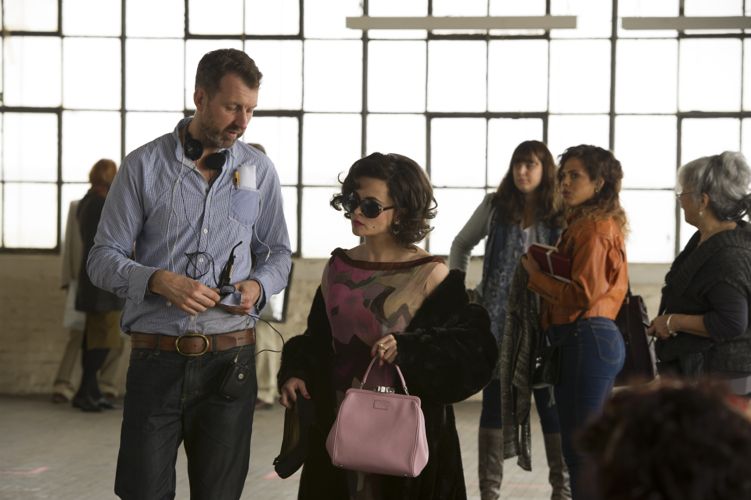
Q: Richard – astonishing that you made such a great film in 18 days. Was that the biggest challenge for you as a director?
Richard Laxton: “No. I think every project has its own challenge. The time was terrifying because I couldn’t bear not to shoot the script. It wasn’t like there were bits of it where we were like, ‘We’ll gloss over that bit.’ I wanted to capture it all. These two, as soon as we started rehearsing and actually when we started the first day of shooting, you just went, ‘This is extraordinary. This has to be shot.’ So you end up in a strange zone. But you just try and grab all of it and capture it. But in a way you have to be incredibly decisive and incredibly confident when you’re working at that speed. And in a way that’s quite healthy because it doesn’t allow you to be over indulgent, I hope. So you have to try and be as sure as you can. I mean, you never know if you’ve completely ****** it up or not. So the time was stressful.”
Q: You said to me Helena earlier that it gave you a great sense of momentum. You were in the zone because you were having to make it so quickly?
Helena Bonham Carter: “There’s no doubt that the shorter the schedule…there are detriments to having a short time to shoot something but when it comes to acting, no. There’s no waiting. Momentum is exceedingly helpful. You get to a point that you’re acting more during the day than waiting and that never happens on film. Hardly ever occurs. So you’re doing it. It has an energy. So much of acting is about creating energy and you’re in a film on a film set and there’s a lot of people around, you’ve got to get the energy off the floor…but if you’re all racing around going it, it’s great. It doesn’t matter. And there’s not the self-consciousness of, ‘Now we’re turning on to you.’ And, ‘Let’s all go and stare at you now and you do your bit.’ Then again, it does mean that other people don’t get to do their job properly. So it’s hard.”
Q: You both look amazing in the role. How did you achieve that? Was it a long process to find those looks?
Helena Bonham Carter: “Well we had great hair and make-up. We had a great lighting man and we had the lenses. Yeah, it took me hours to get ready but…”
Richard Laxton: “We did some camera tests, which we don’t normally do. It was like, ‘Let’s just look at them on camera and see if it’s going to work.’ It helped find a look and nailed some of the issues.”
Helena Bonham Carter: “I will say one thing that does go…you don’t have time…which is very liberating, again for us, because there’s no time between set ups. They’re just straight in.”
Q: The other great authentic element of the film are the accents? They both have very protean accents. They seem to shift a lot. Did you find it hard to nail that?
Dominic West: “Yeah. I was always in danger of trying to be too Welsh. And Richard was always having to pull me back a bit on that. I sort of worked out that there’s Welsh and then it was over-layered with mainly Fifties Oxford University. And then I’ve suddenly realised he’s Olivier’s Richard III a lot of the time. Certainly when he’s in an interview or something, when he was nervous, there would be a lot of Olivier there. Anyway. I don’t know what happened.” (laughter)
Helena Bonham Carter: “I had a great voice coach, Neil Swain.”
Dominic West: “I did too…I insisted on Neil.” (laughter)
Helena Bonham Carter: “There’s no way I could do this without him…we just listened. She went all over the place because she was sort of liquid. She was born actually around the corner from me in Golders Green. Lived the first nine years of her life in Hampstead Garden Suburb and then moved to Hollywood and then came back. Depending on the situation, she had pretty much an American accent but it went all over the shop. So he just dissected it. It was fun…”
James then opened up questions to the audience.
Q: (From me, as it happens) Dominic – I gather you went back to Richard’s birthplace? Did you draw on anything in particular from that visit? And also have either you or Helena ever been applauded into a restaurant?
Dominic West: “I certainly haven’t.”
Helena Bonham Carter: “No. Nor me. Not yet.” (laughs)
Dominic West: “I spent about four or five days in Pontrhydyfen and Port Talbot and round there. And I don’t know what went in. I was just incredibly moved by the place because it’s incredibly beautiful and now all the slag heaps have grown over and there’s a mining museum up the road and that whole liveliehood has gone. It’s incredibly moving for that reason. But I was just moved by the romance of his story, that he’d come from this place and married the most famous, beautiful woman in the world and become the most famous actor in the world at one point. I think that’s a large part of his appeal and I really got the sense of that there. I didn’t meet any of his family but I saw the pub. Unfortunately it was closed. You get a smell, you get an atmosphere….osmosis.”
Q: Helena – you said that Elizabeth grew up around the corner from you. Apart from the tardiness which you have in common, would you say there’s anything else..?
Helena Bonham Carter: “I’m only tardy tonight. (laughter) Apart from Golders Green, we both were brought up in Golders Green…I do think…something that she did say, that she’s a bit of an escapist and went into acting, as a child, National Velvet, she said she loved horses and she always loved animals. And so when she was doing National Velvet, she said, ‘This is great because they’re paying me to ride a horse…it was great pretending to be somebody else.’ And she could understand that she was being paid to do it too. She was a dreamer and on some level I’m definitely like that. I definitely can identify with that. And apart from that…there are lots of things. We’re quite pragmatic on some levels. She was quite no-nonsense, actually. And I think sometimes I am no-nonsense…”
Dominic West: “Your humour and your mischief. She was the only woman in the world who could play her…”
Helena Bonham Carter (As Elizabeth, stroking Dominic): “Oh, Richard…” (laughter)
Q: Was there any trepidation about making this biopic, especially since Elizabeth Taylor hasn’t been very long deceased?
Helena Bonham Carter: “Yes. We were definitely trepidatious and anxious. We were terrified. But you know it’s funny because I just said that I didn’t want to get distracted. I often felt that they were upstaged by their own fame. And I don’t want this to be upstaged by their fame either. I think it’s a beautiful script and I did it because of the script. And it was incidental that it’s called Burton and Taylor.”
Richard Laxton: “Also we took the responsibility of telling this story about them. You have to be very compassionate and thoughtful about people’s relationship with them. But at some point you have to leave that over here and go, ‘This is a version of a story about two people based on those two iconic figures.’ It is nerve-wracking but you just have to be responsible, I think.”
Q: Helena – you mentioned briefly the self-consciousness of having a camera come on to you. It’s very difficult to imagine you ever being self-conscious. Are you really and how do you deal with that?
Helena Bonham Carter: “Of course I get spasms. Of course we get self-conscious. I’m self-conscious now. I think the biggest thing is with acting you always listen, you always focus on something outside yourself. Self-consciousness is a sort of narcissism. So when it comes to film acting, hopefully I’m not aware…well, obviously I’m aware of the camera staring at you…but you’re in a scene and you’re listening to this person helping out with it, because you’re focusing on the person opposite. And in your head, hopefully, no-one else exists…ideally I’m listening to this one (Dominic) and reacting. And it’s Richard Burton. When you’re self-conscious it’s usually because you’re not there. It’s all about suspension of disbelief. And it’s on your own disbelief. I know you’ve got to suspend the audience’s disbelief but first and foremost you’ve got to suspend your own disbelief, which is colossal most of the time. You think, ‘Jesus, what am I trying to be?’ And then you look again and he’s (Dominic) doing such a good job of Richard Burton, I thought, ‘Well I must be Elizabeth Taylor! That’s Richard Burton!” (laughter)
Q: The King Lear references? It seemed to resonate through the piece and I wondered what kingdom Richard was giving up? Was it Liz or were you intending more than that?
William Ivory: “I’ve always been obsessed with Lear as a play. Also I read years and years ago a criticism of it, saying it was the most terrifying of Shakespeare’s plays…this essay was all about, if you strip away the crutches that we all need, what are we ultimately? I think, for me certainly, the question I asked myself when I wrote it was, ‘Why did Richard take on this play?’ Because it didn’t really make a great deal of sense in terms of where he was in his career and what he stood to gain and what he stood to lose. In fact we talked about calling it Love Is The Drug at one stage. Because, for me, that was the issue. He was clean but he hadn’t rid himself of certain patterns of behaviour. So in terms of the Lear reference, it was to try, to get to that point – in terms of Richard’s journey – getting to that point of understanding that he had now become that ‘unaccommodated man’. That he was absolutely looking at himself, stripped bare, and recognising that without Elizabeth he was like a creature that couldn’t quite function. So, for me, the whole of the film was kind of a construct to exlore that, in order to explore their bigger relationship.”
Q: So she was the King?
William Ivory: “Yeah.”
Q: William – I had heard that Elizabeth never actually wanted a biopic done. Did you have any problems with the existing family and were you as honest as you wanted to be?
William Ivory: “Yeah. I was certainly as honest as I wanted to be. We made all of the surviving members aware of the fact that the film was being written. I know it’s part of the biopic season but, for me, it wasn’t ever really a biopic. It was a film about very famous people who were actually experiencing a love affair that we might all recognise at whatever level. So really it was…you let everybody know, you make sure that your facts are right. But it’s like building a house in terms of those factual things are the walls and the foundations but once I’m inside the room after that, I’m not too fussed, really. Because it’s about trying to understand. And you can’t create a drama if all the time you’re absolutely wedded to every single detail. But there was no point at which I actually felt that I had to hold back in any way at all. Which was terrific.”
Helena Bonham Carter: “Also, it was a bit based on one of the bios, The Furious Love, which is pretty out there. And that definitely had her permission. In fact it was positively encouraged to be written. Because also, which was funny for me, I was reading it and I got to the end and started laughing. I was in bed with Tim Burton (Helena’s long term partner) at that point…and I said, ‘It’s funny. I’ve just got to the end and Elizabeth wanted this to be written because the authors went to UCLA and were talking about it, saying, ‘We’re writing a biography of the Burton and Taylor love, their whole relationship.’ And the response of most of the students was, ‘I didn’t know that Elizabeth Taylor is married to Tim Burton?’ She was so horrified that she said, ‘The name must be reclaimed. This is terrible! Please write it.’ So they did. They had her blessing. I’m friendly now with her friends and I really think she had such a sense of humour, and such a huge humanity to her, that I don’t think she would have disapproved.”
Q: I read somewhere that she said, ‘No-one can play me.’?
Helena Bonham Carter: “No, I think you’re absolutely right. No-one can play her. But this is a drama. There’s no point in doing it. She was inimitable. There will be no-one like her. Or him. But that’s not what we were pretending…well I guess we are, literally, pretending to be them. But you get what I mean.”
William Ivory: “My favourite moment in the film is the little bit where they’re in Rock Hudson’s apartment and the family come in. I adore that moment for the way Elizabeth is with the baby and saying, ‘This is just an apartment.’”
Helena Bonham Carter: “Yeah. A rock set of values. Absolutely. That’s what I mean – a pragmatism. The fame thing…she completely knew what life was about ultimately. Which is love and connecting with your loved ones….and diamonds (laughter), money, drink, mashed potato, chocolate…”
********************************************************
This very occasional Life of Wylie TV blog recently recorded over one million page views since it moved to a new platform under four years ago. A drop in the ocean in the scheme of things but I’d like to thank everyone who has ever taken the time to read something here.
The Guardian: Being Burton and Taylor
